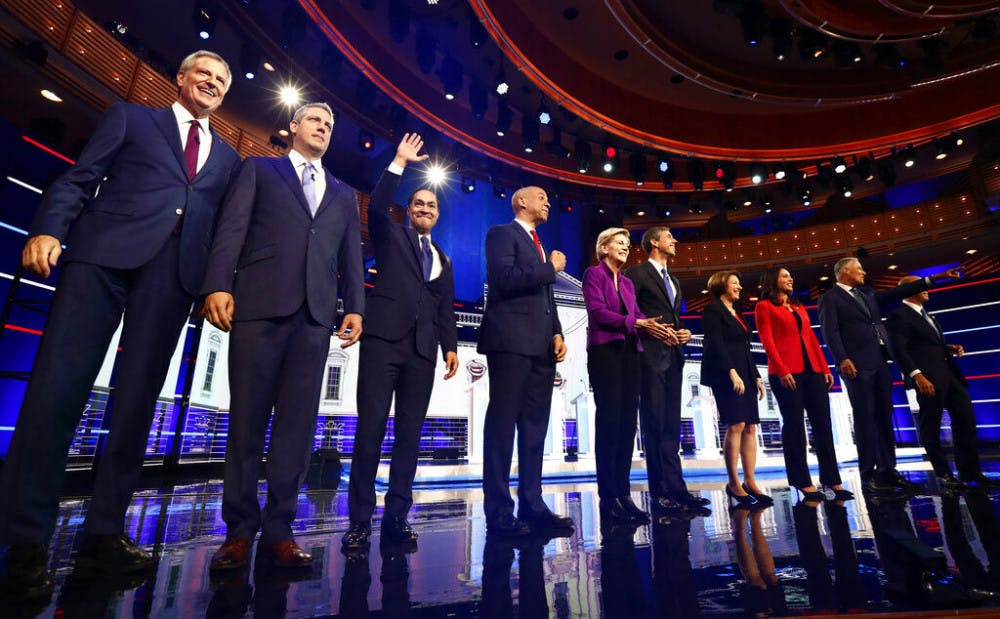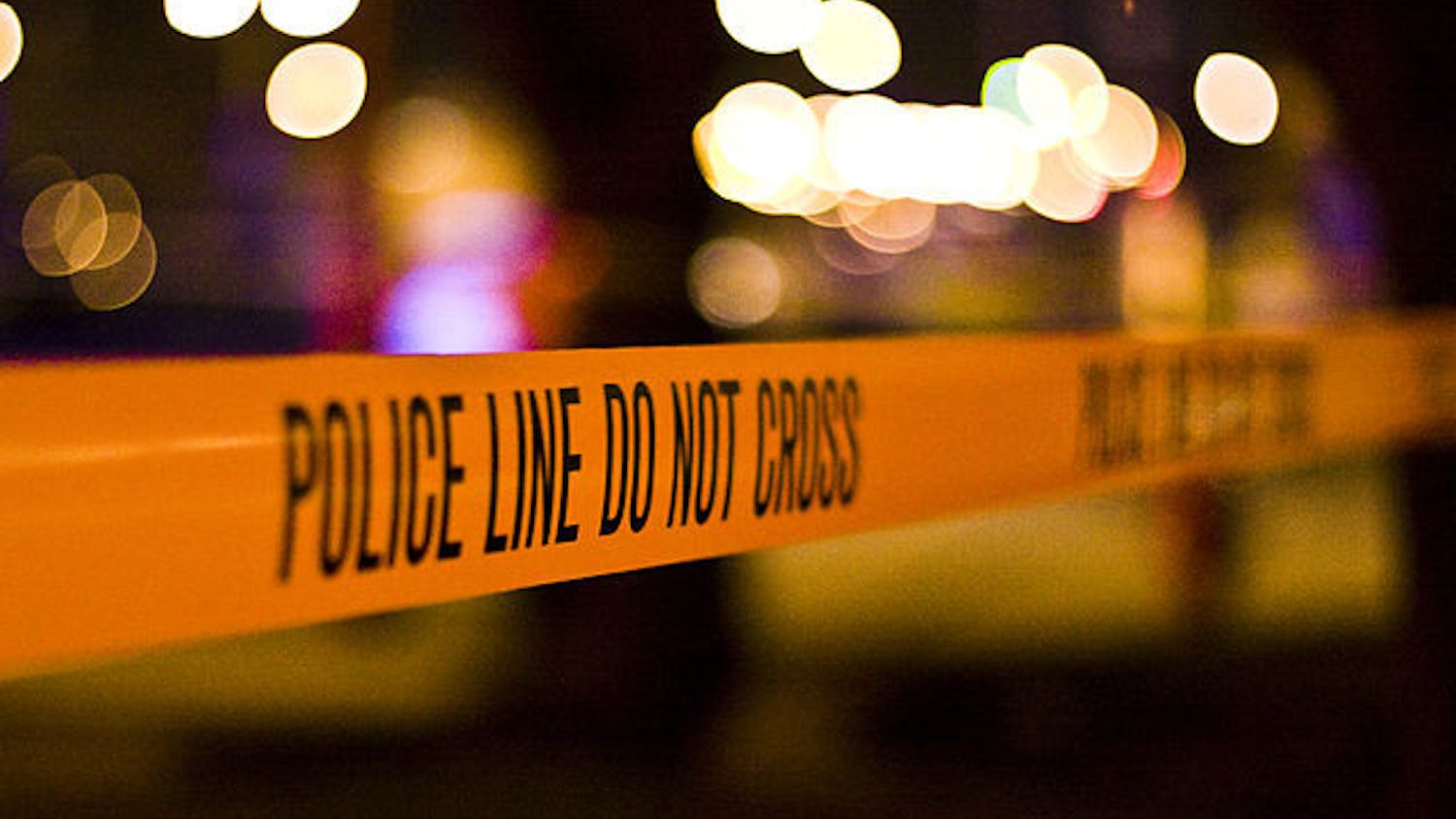Ten presidential candidates discussed issues such as immigration, healthcare, gun reform, economic policies and climate change in Miami on Wednesday night during the first Democratic presidential debate.
The debate is two nights long and features 20 candidates total who were split randomly between the two nights. Wednesday’s candidates were New Jersey Sen. Cory Booker, former Housing Sec. Julián Castro, New York City Mayor Bill de Blasio, former Maryland Rep. John Delaney, Hawaii Rep. Tulsi Gabbard, Washington state Gov. Jay Inslee, Minnesota Sen. Amy Klobuchar, former Texas Rep. Beto O'Rourke, Ohio Rep. Tim Ryan and Massachusetts Sen. Elizabeth Warren.
Candidates appeal to Latinx voters
The candidate pool features more diversity than years past. Three candidates spoke Spanish during the debate –– O’Rourke, Booker and Castro –– demonstrating a desire to connect with larger Hispanic constituencies, the largest minority group in the U.S.
“The very fact that I can say that tonight shows the progress that we have made in this country. Like many of you, I know the promise of America,” said Julián Castro, who is currently the only Latinx 2020 candidate.
Differing views on immigration
In further solidarity with the Hispanic community, the candidates expressed a desire to change current border policies at the start of their presidencies. This topic was escalated by a recent photo taken of a father and daughter dead in the Rio Grande while attempting to cross the U.S. border.
The subject of immigration is especially important in Miami due to its considerable immigrant population and the Homestead Temporary Shelter for Unaccompanied Children, the largest detention center for immigrant children.
Castro and O’Rourke had a stand-off moment when discussing immigration. Castro questioned O’Rourke, asking him why he was opposed to decriminalized improper border crossings.
When asked about immigration and a devastating photo of a father and daughter dead in the Rio Grande, Castro said, “If I were president today, I would sign an executive order that would get rid of Trump’s zero tolerance policy, the stay in Mexico policy, and the metering policy."
— April Rubin (@AprilMRubin) June 27, 2019
Booker responded in Spanish. "Este presidente a atacado y demonizado los inmigrantes," he said, meaning "This president has attacked and demonized immigrants."
— April Rubin (@AprilMRubin) June 27, 2019
Carlos Tagliafico, a Miami resident, attended a watch party at Books & Books, a bookstore next to where the debate was held. He was interested in seeing how the Democratic candidates would demonstrate their potential against President Donald Trump.
“There are so many issues going on right now between the Democratic Party and Republican Party in the country itself that I really want to know what they are going to talk about in Florida,” he said. “I want to see if they’re going to address some of the issues that we are trying to hear from them like immigration and what is going to happen with the Homestead Detention Center.”
Showing support for women’s rights
The candidates showed a wide-spread acceptance for progressive human rights issues. They demonstrated unanimous support for abortion rights, a topic becoming increasingly relevant with the passing of state laws that restrict reproductive rights.
Warren mentioned she wants to increase protections on abortions rights by passing a federal law rather than relying on Roe v. Wade. Castro said abortion not only had to be legal but economically available and endorsed a government-funded healthcare option that would cover abortions for all.
Castro was asked if his healthcare plan would support a woman's right to choose. His answer was yes, and added that transgender people as well as women deserve reproductive rights.
— April Rubin (@AprilMRubin) June 27, 2019
Wednesday night featured the most women to ever participate in a presidential debate.
Bringing gun control to the forefront
With the surge of gun violence in the U.S. and the divisive nature of this topic on the national level, considerable discussion was given to gun reform. All candidates agreed on its necessity in some capacity, highlighting the effect gun violence has on children and teenagers.
With the Parkland, Florida, shooting at Marjory Stoneman Douglas High School and a Pulse nightclub shooting in Orlando, gun control is a topic of major concern in Florida.
“Gun violence is a national health emergency in this country, and we need to treat it like that," Warren said. She supports policies such as universal background checks, banning weapons of war and increasing research to figure out the smartest changes that can be made.
— April Rubin (@AprilMRubin) June 27, 2019
Booker said he thinks he is the only candidate who hears gunshots in his neighborhood. "I'm tired of hearing people say all they have to offer is thoughts and prayers," he said. He wants bold actions to change gun laws. "This is not policy. This is personal."
— April Rubin (@AprilMRubin) June 27, 2019
Ryan is the first candidate to discuss mental health so far. "These kids are traumatized. I support all the gun reform here," he said. "We need to deal with the trauma our kids have. Trauma-based skills in every school."
— April Rubin (@AprilMRubin) June 27, 2019
"I'm different from all the other candidates in this race in that I'm raising a black son in America," said De Blasio. He says that there is a need to create unity between communities and law enforcement.
— April Rubin (@AprilMRubin) June 27, 2019
Addressing the environment and climate change
The conversation also focused on environmental policy and combating climate change. Many of the candidates said the current administration took steps backward in this regard, as well as with the other issues.
Warren mentioned oil companies; O’Rourke brought up fossil fuels; Castro spoke about community vulnerability; Ryan believes in a carbon tax; Inslee wants to start tackling climate change by taking the filibuster away from Senate Majority Leader Mitch McConnell.
Toward the end of the debate, candidates were asked what or who is the greatest geopolitical threat to the U.S. Four candidates responded with climate change.
Moving into climate change, another relevant topic among young voters, Inslee says that his generation is the last that can do something about it. "Our towns are burning. Our fields are flooding. Miami is inundated. We have to understand this is a climate crisis," he said.
— April Rubin (@AprilMRubin) June 27, 2019
Castro agrees with the current gravity of climate change, saying the first thing he would do as president is sign an executive order to have the U.S. re-enter the Paris Climate Accord.
— April Rubin (@AprilMRubin) June 27, 2019
In their closing remarks and post-debate remarks, all the candidates urged voters that they were the best fit for the White House and for the country, one final time, speaking about their experience, goals and how they would defeat Trump.
“I am in this fight because I believe that we can make our government, we can make our economy, we can make our country work not just for those at the top,” Warren said. “We can make it work for everyone. And I promise you this: I will fight for you as hard as I fight for my own family.”
Follow April on Twitter @AprilMRubin for Night Two coverage.
From left, New York City Mayor Bill de Blasio, Rep. Tim Ryan, D-Ohio, former Housing and Urban Development Secretary Julian Castro, Sen. Cory Booker, D-N.J., Sen. Elizabeth Warren, D-Mass., former Texas Rep. Beto O’Rourke, Sen. Amy Klobuchar, D-Minn., Rep. Tulsi Gabbard, D-Hawaii, Washington Gov. Jay Inslee, and former Maryland Rep. John Delaney pose for a photo on stage before the start of a Democratic primary debate hosted by NBC News at the Adrienne Arsht Center for the Performing Arts, Wednesday, June 26, 2019, in Miami.






